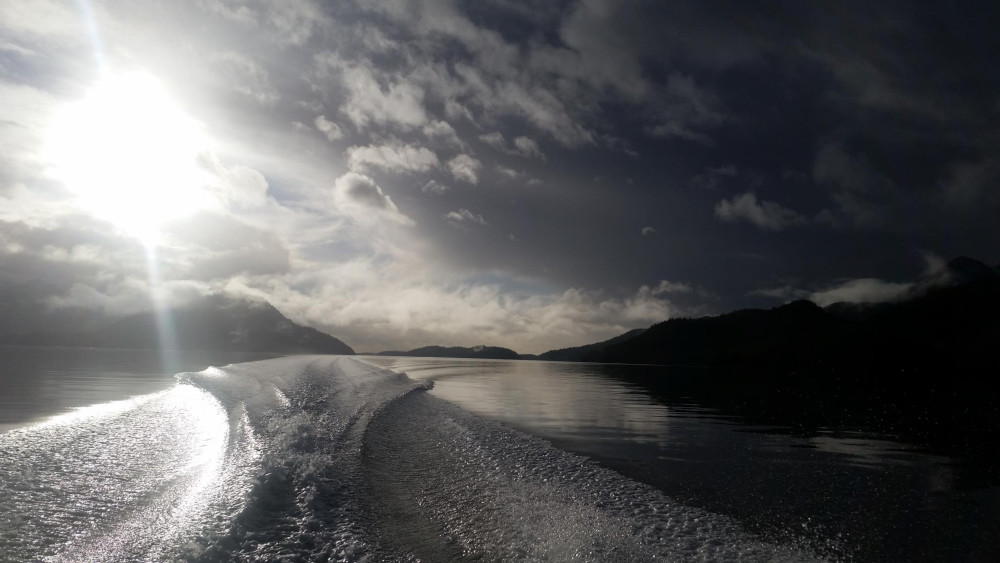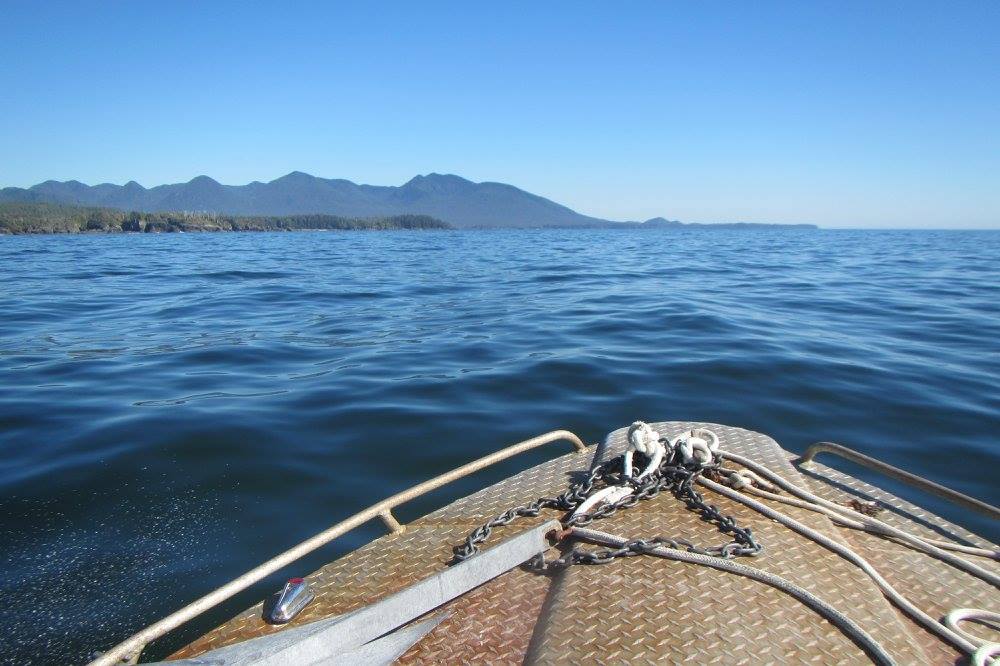When checking the mail involves a 90-minute boat trip, it becomes a special occasion. Some days it feels almost like Christmas.
Hold-it-in-my-hand Canada Post mail, the delivered-to-my-post-box-in-Tofino mail, is a big deal. We’re only able to pick it up every few weeks, sometimes once a month. It’s special.
My husband and I have had our post office box in Tofino since the mid-1970s. He’s a commercial fisherman, and back then he delivered fish, bought fuel and often tied up his boat in Tofino. When we had our first child and began to stay further up the coast at my husband’s home in Hot Springs Cove, in Hesquiaht First Nation territories, we continued to use the Tofino mailbox. Tofino was — and still is — the closest place we could get our mail and access things like health care, banks and a full grocery store.
Hot Springs Cove is about 50 kilometres up the Pacific coast from Tofino. Hesquiat Harbour, where we live today, is another 25 kilometres. Our journey to pick up the mail takes us from Hesquiaht territories, which make up roughly the northwestern third of Clayoquot Sound, to Tla-o-qui-aht territories, which include Tofino, in the southern section of the sound.
Faster boats have shortened the trip. In my husband’s 12-metre wooden troller with its diesel engine, it took more than three hours to get from Tofino to Hot Springs Cove. In our six-metre-long open aluminum speedboat with its 225 hp outboard motor, we can be there in a mere hour and 10 minutes — at least on a calm day.
In the early and mid-parts of the 20th century, there were post offices in both Hot Springs Cove and Hesquiat Harbour. Ships carrying freight and passengers and mail plied the coast, serving fish buyers and related businesses like stores and fuel stations. The post offices were operated by settlers who chose those locations with economic opportunities in mind. When those opportunities ran dry, their ventures, and the post offices, closed.
There are no roads that connect Hesquiaht territories to Tofino. If we want to go to “Tuff City” or “Tuff” — the local nicknames — we travel by boat or, occasionally, by float plane. There are no public ferries. What has developed instead is a transportation system built upon a wide array of locally owned and operated private boats and water taxis. They range in size from canoes and small runabouts to larger commercial fishing vessels. Most of the water taxis are aluminum boats with cabins that comfortably seat six to 12 passengers.

For the last decade or so, my husband and I have lived year-round at a place called Ayyi’saqh in Hesquiat Harbour. It is the territory of Kinquashtacumth — one of the “houses” (some people call them “clans”) that make up the Hesquiaht First Nation. Because boat travel here involves the 20-plus kilometres of open coastline stretching from Hesquiat Point past Hot Springs Cove, travel can be difficult in fall and winter months when the Pacific storms roll in. There are plenty of days from October to February when travelling across the open ocean is just not a good idea.
I’m hoping this will help you understand our disappointment on one particular day when we arrived at the Tofino post office and realized that we had forgotten the key to our post office box.
We were crushed. We were well aware of the Canada Post rule: No key, no mail. My husband and I are both well into our sixties. Going all the way home in our boat, retrieving our key and returning the next day wasn’t going to happen. It would probably be weeks before we came back down the coast again.
A long-time friend, a local minister, came by. (The post office is a good spot to meet people; everyone needs to check their mail.) He was cheerful and glad to see us. It was impossible to pretend that things were alright, so we told him our story.
“Can’t you just ask them?” he said.
We all remembered that the tight Canada Post rules hadn’t always been in place. Staff could help people who had forgotten or lost their keys, retrieving the mail from their boxes and handing it over the counter.
It was a faint glimmer of hope. I had seen the post office clerk regularly for at least a few years. She had to know my name or recognize my face. Or so I figured.
The answer was a definite no. No doubt, she had heard many sob stories. And she’d probably learned how to tune them out.
My husband and I tried to forget about our mail. We headed to the Chinese restaurant where we often go for lunch when we are in Tuff City. It’s seldom closed, but it was that day. It was hard to not feel devastated.
I need to back up a little in my story here and tell you about what had happened before we even reached the Tofino post office. That morning my husband had driven our small utility vehicle — a more rugged version of a golf cart — to the Boat Basin at the head of Hesquiat Harbour. The basin is more protected, and where we keep our boat in the stormy season. His plan was to pick up the boat, anchor out front of our cedar-shaked cabin and then paddle ashore to pick me up in the canoe.
But as I waited on the sand beach, I could see our boat drifting across the harbour. The motor had been acting up — water was collecting in the fuel filter — and I figured that my husband was working on it. The day was calm and sunny, and he usually fixes that problem in a few minutes, so I was not too worried. This time, however, the fix seemed to be taking longer.
By fluke — a very lucky fluke — the Hesquiaht First Nation’s fisheries boat, skippered by my husband’s brother, came into the harbour and headed over to our boat. I was relieved — at least my husband had help and a tow if needed. Eventually our motor started again, and my husband came and picked me up. We were more than an hour later than expected, but on our way to Tofino.
Tying up at one of three usually crowded public wharves is the only practical option for people arriving in Tofino by water. The water at the wharf we use, however, is becoming shallower and shallower as sand settles on the bottom. When we arrived on this day, the only available spot was just a little too shallow for our boat. We had to wait as the tide came in.
A troublesome motor, a boat stuck waiting for the tide — only after almost four hours of effort were we finally off the boat and walking up the hill to the post office. By then, it really was a big deal to get our mail. Except it was not going to be.
I had an appointment early that afternoon with my doctor, the reason that we had chosen that day to go to Tofino. I have seen the same doctor for many years. He is an old friend, so I couldn’t help myself: I told him our story of no mail, no restaurant lunch. “Can’t you just ask them?” he said.
My husband and I came up with a solution. Instead of going home and waiting for our next trip to Tofino, we could make the two-hour drive to Port Alberni and stay overnight. Our youngest son had recently moved there, and he had a key for our post box. We could get that key copied and then drive back to Tofino the next morning.
We stayed with our daughter, who also lives in Port Alberni. I told her the story about the forgotten mail key.
“You mean you had a minister and a doctor vouching for you, and they still would not give you your mail?” she asked me with a smile.
“Nope,” I told her. “Guarantors might be good enough for a passport, but not for Canada Post.”
The post office is dependable, within business hours the very pillar of reliability. Because there is no home mail delivery in the area, all Tofino residents and nearby (and not so nearby) residents use the same set of post office boxes. Aside from the fact that those with a physical address in Tofino get their boxes free of charge while we have to pay annual fees, we get the same services as town residents.
Having spent many years living on Hesquiaht Indian Reserve #6 at Hot Springs Cove, that’s something to appreciate — services like any other small-town Canadian.
When I first met my husband and got to know Tofino, I thought of the place as a fishing village. It felt like an outpost really, an end-of-the-road spot where fishermen and loggers and Indians from up the coast came to shop, deliver fish and go to the beer parlour.
Today, I’m amazed at my own ignorance. I did not know, for example, that the Tofino post office was built on Tla-o-qui-aht territory, on top of a place already named ńačiqs (roughly pronounced nachaks in English). Just above the wharf where we used to tie up the boat, there were Tla-o-qui-aht houses where people I was getting to know had lived and grown up. Now they were replaced by houses lived in by non-Tla-o-qui-aht people.
We had our son’s key copied in Port Alberni. We picked up our mail — parcels included — the next day when we returned to Tofino. We made it home safely in our boat. I am no longer upset about rules that keep the post office running smoothly.
There is steel beneath the surface of Canada Post. No matter how friendly the local post office workers are, Canada Post is a government institution. The country of Canada did not go about establishing its infrastructure on someone else’s territories without a large dose of steely arrogance. It does not maintain that infrastructure without a significant amount of confidence in its own privilege and right to make and enforce its rules.
Perhaps I go too far. My intent in beginning this rather simple story about not being able to pick up my mail was not to do anything other than tell an amusing anecdote. It seems “politics,” as much a part of our lives as travelling in the boat, has reared its head once again. It is impossible to hide from the political realities of the not-so-distant past, and the present.
Our utter disappointment that day we could not get our mail wasn’t just about the post office. We rely upon the services the Village of Tofino offers. We travel — sometimes with quite a bit of difficulty and expense — to reach services that people in the village have right next to them on a daily basis.
When I arrive in Tofino, I can’t help but feel like I have accomplished my end of an unwritten bargain. I have done my part. When we can’t access services at the hospital, bank, grocery store, doctor’s office or post office — even for valid reasons like the lack of an appointment, an already overloaded doctor’s schedule, shortened seasonal hours or a forgotten key — I think it is understandable to feel unfairly deprived. It is easy to feel resentful not only towards Tofino, which has the services, but at the lack of services in our own communities further up the coast.
About a year ago, an elderly man — one of Tuff City’s longtime settler residents — asked my husband a friendly question, at least from his perspective, just outside the Post Office.
“Are you still living out in the weeds?” the Tofino man asked.
That question was a bit of a trigger for my husband — a bit like that lack of a mail key was a trigger. He held his tongue that day, just like on other days. He mumbled a reply and moved on. The memories of poor treatment, of being marginalized or ignored, of residential schools within spitting distance of Tofino — the list is not a short one and the scars are still recent, raw.
My husband keeps a mail key now. I keep a second mail key. We have improved our chances of a successful visit to the Tofino post office. We really do not want a repeat of that day our key was forgotten.
We want to happily savour a special occasion. We want to pick up our mail.
Do you have an Extremely B.C. true story to share? It could be amazing, terrifying, sublime, hilarious, life changing. We publish interview-based pieces like the one above, or first person memoirs. If your story is great, we might talk to you and convert the conversation to an ‘as told to’ written or audio piece. In that case send an email telling us the basics of your tale. If you prefer to share a video or audio piece, please do. We can’t guarantee we will publish every one, but we promise to get back to you. Send it to info (at) thetyee (dot) ca with the subject line ‘Extremely B.C.’ And yep, we pay! ![]()
Read more: Transportation, Media
















Tyee Commenting Guidelines
Comments that violate guidelines risk being deleted, and violations may result in a temporary or permanent user ban. Maintain the spirit of good conversation to stay in the discussion.
*Please note The Tyee is not a forum for spreading misinformation about COVID-19, denying its existence or minimizing its risk to public health.
Do:
Do not: